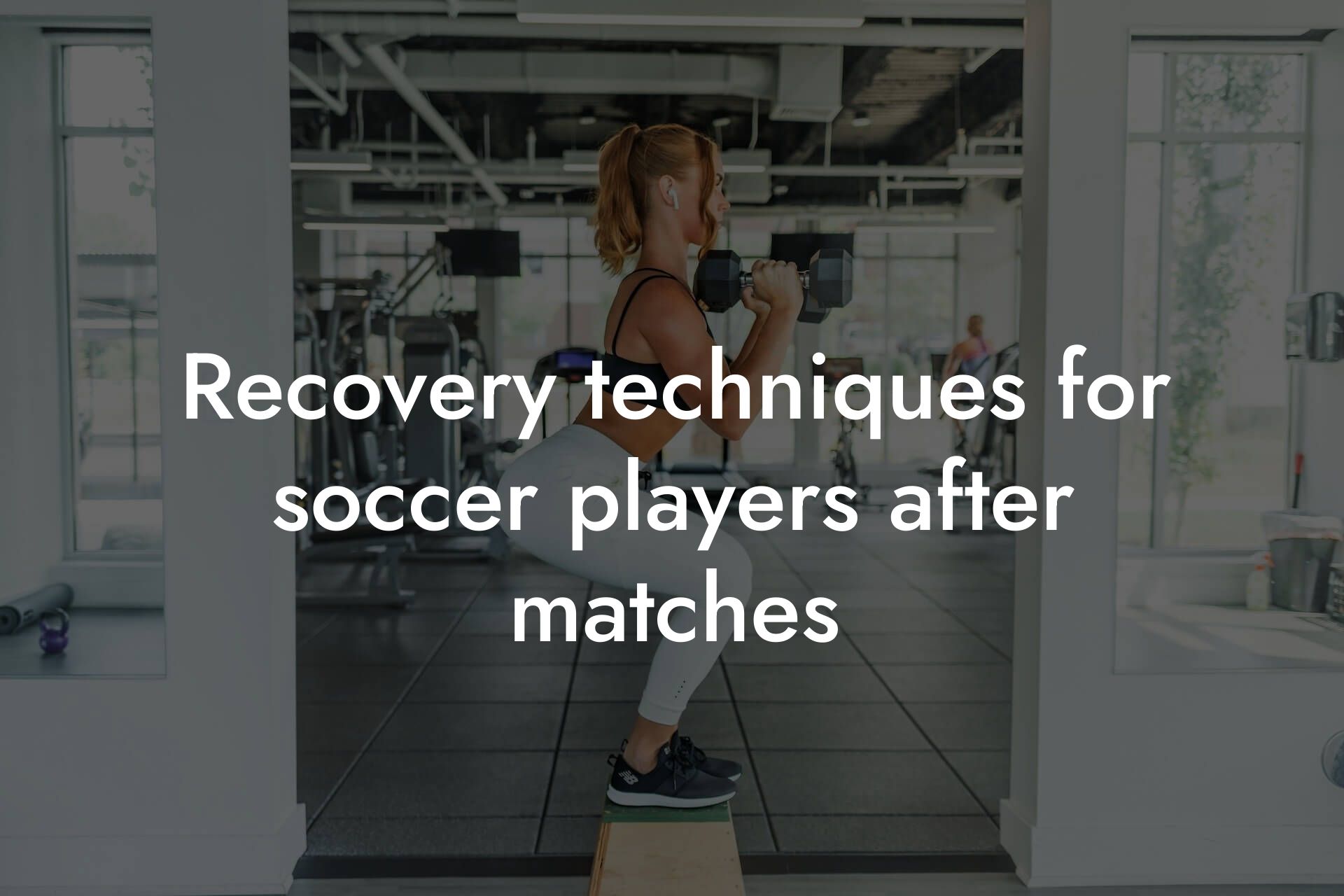Understanding Energy Needs for Soccer Players
Soccer is a high-intensity sport that requires a combination of endurance, strength, speed, and agility. During a 90-minute match, players can cover up to 10 kilometers, with repeated bursts of high-intensity effort. To perform at their best, soccer players need to fuel their bodies with the right nutrients to maintain energy levels throughout the game. A well-planned nutrition strategy can make all the difference in achieving peak performance and gaining a competitive edge.
Table of Contents
- Understanding Energy Needs for Soccer Players
- Macronutrient Balance for Energy Production
- Carbohydrate Loading for Soccer Players
- Hydration Strategies for Soccer Players
- Electrolyte Balance and Soccer Performance
- Pre-Game Meal Strategies for Soccer Players
- Half-Time Snacks for Soccer Players
- Post-Game Nutrition Strategies for Soccer Players
- Individualized Nutrition Planning for Soccer Players
- Frequently Asked Questions
Macronutrient Balance for Energy Production
Carbohydrates, protein, and fat are the three macronutrients that provide energy for the body. A balanced diet that includes the right proportions of each macronutrient is essential for sustained energy during soccer matches. Carbohydrates are the primary source of energy for high-intensity activities, while protein helps to build and repair muscles. Fat is also an important energy source, particularly during low-intensity activities.
A general guideline for soccer players is to consume a diet that consists of 55-65% carbohydrates, 15-20% protein, and 20-25% fat. However, individual energy needs may vary depending on factors such as position, playing style, and fitness level. For example, midfielders who cover a lot of distance during a match may require more carbohydrates than goalkeepers who are less active.
Carbohydrate Loading for Soccer Players
Carbohydrate loading is a nutrition strategy that involves consuming a high amount of carbohydrates in the 24-48 hours leading up to a match. This helps to maximize glycogen stores in the muscles and liver, which can be used as energy during the game. Carbohydrate loading can be particularly beneficial for soccer players who need to perform at high intensities for prolonged periods.
Good sources of carbohydrates for soccer players include whole grains, fruits, vegetables, and sports drinks. It's also important to consume carbohydrates with a moderate to high glycemic index, such as white bread, pasta, and sports drinks, which can help to rapidly replenish energy stores.
Hydration Strategies for Soccer Players
Adequate hydration is critical for soccer players to maintain energy levels and perform at their best. Even mild dehydration can lead to fatigue, decreased speed, and impaired decision-making. Soccer players should aim to drink at least 8-10 glasses of water per day, and make sure to drink water during and after training sessions and matches.
In addition to water, soccer players can also consume sports drinks that contain electrolytes such as sodium and potassium. These electrolytes help to regulate fluid balance in the body and can become depleted during intense exercise. Sports drinks can be particularly beneficial for soccer players who lose a lot of sweat during matches or training sessions.
Electrolyte Balance and Soccer Performance
Electrolytes play a crucial role in regulating various bodily functions, including nerve and muscle function. During intense exercise, electrolytes can become depleted, leading to muscle cramps, fatigue, and decreased performance. Soccer players can maintain electrolyte balance by consuming electrolyte-rich foods and drinks, such as bananas, dates, and sports drinks.
Sodium is an essential electrolyte that helps to regulate fluid balance in the body. Soccer players can consume sodium-rich foods such as pretzels, crackers, and soups to help maintain sodium levels. Potassium is another important electrolyte that helps to regulate muscle function. Foods rich in potassium include bananas, avocados, and sweet potatoes.
Pre-Game Meal Strategies for Soccer Players
The pre-game meal is an important part of a soccer player's nutrition strategy. The goal of the pre-game meal is to provide energy, prevent hunger, and minimize digestive discomfort during the game. A general guideline for the pre-game meal is to consume a balanced meal that includes carbohydrates, protein, and fat, 2-3 hours before the game.
Good options for the pre-game meal include oatmeal with fruit and nuts, whole-grain toast with avocado and eggs, and grilled chicken with sweet potatoes and vegetables. It's also important to stay hydrated by drinking water or sports drinks during and after the meal.
Half-Time Snacks for Soccer Players
The half-time snack is an important opportunity for soccer players to refuel and rehydrate during the game. The goal of the half-time snack is to provide a quick burst of energy and electrolytes to help players perform at their best during the second half.
Good options for half-time snacks include sports drinks, energy bars, and fruit such as oranges, bananas, and apples. These snacks are easy to digest, provide a quick source of energy, and can help to replenish electrolytes.
Post-Game Nutrition Strategies for Soccer Players
The post-game meal is an important part of a soccer player's nutrition strategy. The goal of the post-game meal is to replenish energy stores, repair muscles, and promote recovery. A general guideline for the post-game meal is to consume a balanced meal that includes carbohydrates, protein, and fat, within 30-60 minutes after the game.
Good options for the post-game meal include chocolate milk, protein shakes, and meals that include lean protein, complex carbohydrates, and healthy fats. It's also important to stay hydrated by drinking water or sports drinks during and after the meal.
In addition to nutrition, soccer players can also use other recovery strategies such as stretching, foam rolling, and compression garments to help promote recovery and reduce muscle soreness.
Individualized Nutrition Planning for Soccer Players
Every soccer player is unique, with different energy needs, dietary preferences, and nutritional goals. An individualized nutrition plan can help soccer players to optimize their performance, achieve their goals, and reduce the risk of injury and illness.
At Tano Performance Group, we use advanced body composition analysis, including DEXA scanning, to provide soccer players with a comprehensive understanding of their nutritional needs. Our team of experts can then work with players to develop a personalized nutrition plan that takes into account their individual needs, goals, and preferences.
By combining advanced body composition analysis with expert nutrition guidance, soccer players can optimize their performance, gain a competitive edge, and achieve their goals in the sport they love.
Frequently Asked Questions
What are the key nutrition strategies for sustained energy during soccer matches?
Optimal nutrition is crucial for sustained energy during soccer matches. The key strategies include consuming a balanced diet that includes complex carbohydrates, lean protein, and healthy fats, staying hydrated by drinking plenty of water, and fueling with sports-specific nutrition such as energy gels and bars. Additionally, timing of nutrition intake, individualized nutrition planning, and periodized nutrition are also essential for optimal energy levels.
Why is nutrition important for soccer players?
Nutrition plays a critical role in a soccer player's performance. It provides energy, supports recovery, and helps to prevent injuries and illnesses. A well-planned diet can improve endurance, speed, agility, and overall physical performance, giving players a competitive edge.
What are the best sources of complex carbohydrates for soccer players?
Complex carbohydrates such as whole grains, fruits, and vegetables are rich in energy and essential for soccer players. Good sources include brown rice, whole wheat bread, quinoa, sweet potatoes, broccoli, and bananas. These foods provide sustained energy, fiber, and essential vitamins and minerals.
How much protein do soccer players need?
Soccer players require a moderate to high amount of protein to support muscle repair and recovery. The recommended daily intake is 1.2-1.6 grams of protein per kilogram of body weight, spread across 3-5 main meals and 2-3 snacks. Good sources of protein include lean meats, fish, eggs, dairy, legumes, and nuts.
What is the role of healthy fats in a soccer player's diet?
Healthy fats are essential for energy production, hormone regulation, and absorption of vitamins and minerals. Good sources of healthy fats include nuts, seeds, avocados, olive oil, and fatty fish. They should make up 20-30% of a soccer player's daily calorie intake.
How important is hydration for soccer players?
Hydration is critical for soccer players, as even mild dehydration can impair performance. Players should aim to drink at least 8-10 glasses of water per day, and make sure to drink water during and after training and matches.
What are sports-specific nutrition products, and how can they benefit soccer players?
Sports-specific nutrition products such as energy gels, bars, and drinks are designed to provide quick energy and electrolytes during high-intensity activities like soccer. They can help to prevent dehydration, maintain energy levels, and support recovery.
How can soccer players individualize their nutrition plan?
Soccer players can individualize their nutrition plan by considering their position, playing style, climate, and personal preferences. They should also consult with a sports dietitian or nutritionist to develop a personalized plan that meets their specific needs.
What is periodized nutrition, and how can it benefit soccer players?
Periodized nutrition involves adjusting nutrition intake based on the training phase and competition schedule. It can help soccer players to optimize energy levels, support recovery, and peak at the right time. For example, during intense training phases, players may require more carbohydrates and protein to support energy needs.
Can nutrition help to prevent injuries and illnesses in soccer players?
Yes, nutrition can play a critical role in preventing injuries and illnesses in soccer players. A well-planned diet can help to support immune function, reduce inflammation, and promote muscle and bone health, all of which can help to prevent injuries and illnesses.
How can soccer players ensure they are getting enough vitamins and minerals?
Soccer players can ensure they are getting enough vitamins and minerals by consuming a balanced diet that includes a variety of whole foods, fruits, and vegetables. They should also consider taking a daily multivitamin and mineral supplement, especially during periods of intense training and competition.
What are the best foods for recovery after a soccer match?
The best foods for recovery after a soccer match are those that provide carbohydrates and protein to support muscle repair and recovery. Good options include bananas with peanut butter, chocolate milk, and turkey or chicken wraps with avocado.
How soon after a soccer match should players refuel?
Players should aim to refuel within 30-60 minutes after a soccer match, when their muscles are most receptive to nutrient uptake. This can help to promote recovery, reduce muscle soreness, and support muscle repair.
Can nutrition help to improve mental performance in soccer players?
Yes, nutrition can play a critical role in improving mental performance in soccer players. A well-planned diet can help to support brain function, reduce stress and anxiety, and promote focus and concentration.
How can soccer players manage their nutrition during tournaments?
Soccer players can manage their nutrition during tournaments by planning ahead, packing snacks and meals, and staying hydrated. They should also consider working with a sports dietitian or nutritionist to develop a personalized nutrition plan.
What are the best snacks for soccer players?
The best snacks for soccer players are those that provide a combination of carbohydrates and protein, are easy to digest, and can be consumed on-the-go. Good options include energy bars, nuts, dried fruits, and sandwiches.
Can nutrition help to reduce muscle cramps in soccer players?
Yes, nutrition can help to reduce muscle cramps in soccer players. A diet that includes adequate electrolytes, magnesium, and potassium can help to prevent muscle cramps. Additionally, staying hydrated and consuming sports-specific nutrition products can also help.
How can soccer players ensure they are getting enough electrolytes?
Soccer players can ensure they are getting enough electrolytes by consuming electrolyte-rich foods and drinks, such as bananas, avocados, coconut water, and sports drinks. They should also consider taking an electrolyte supplement, especially during periods of intense training and competition.
What is the role of probiotics in a soccer player's diet?
Probiotics can help to support gut health, immune function, and overall health in soccer players. They can also help to reduce symptoms of irritable bowel syndrome and improve digestion.
Can nutrition help to improve bone density in soccer players?
Yes, nutrition can help to improve bone density in soccer players. A diet that includes adequate calcium, vitamin D, and protein can help to support bone health and reduce the risk of osteoporosis.
How can soccer players ensure they are getting enough calcium?
Soccer players can ensure they are getting enough calcium by consuming calcium-rich foods such as dairy, leafy greens, and fortified plant-based milk. They should also consider taking a calcium supplement, especially during periods of intense training and competition.
What are the best nutrition strategies for goalkeepers?
Goalkeepers require a unique nutrition strategy that takes into account their specific energy needs and position-specific demands. They should focus on consuming a balanced diet that includes complex carbohydrates, lean protein, and healthy fats, and stay hydrated throughout the match.
How can nutrition help to improve endurance in soccer players?
Nutrition can help to improve endurance in soccer players by providing the necessary energy and nutrients to support prolonged periods of exercise. A diet that includes complex carbohydrates, lean protein, and healthy fats can help to improve endurance and reduce fatigue.
What are the best nutrition strategies for defenders?
Defenders require a nutrition strategy that takes into account their high-intensity, high-impact position. They should focus on consuming a balanced diet that includes complex carbohydrates, lean protein, and healthy fats, and stay hydrated throughout the match.
How can nutrition help to improve speed and agility in soccer players?
Nutrition can help to improve speed and agility in soccer players by providing the necessary energy and nutrients to support high-intensity exercise. A diet that includes complex carbohydrates, lean protein, and healthy fats can help to improve speed and agility.
Here are some related articles you might love...
- Recovery techniques for soccer players after matches
- Bone density and injury prevention for soccer players
- Using DEXA scans to monitor soccer player progress
- Strength training programs for amateur soccer players
- The impact of body composition on soccer performance
- Off-season conditioning for amateur soccer athletes
- Reducing body fat to enhance agility and speed in soccer
- Hydration and nutrition tips for weekend soccer warriors
Zak Faulkner
Zak Faulkner is a leading authority in the realm of physical health and body composition analysis, with over 15 years of experience helping professionals optimise their fitness and well-being. As one the experts behind Tano Performance Group, Zak has dedicated his career to providing in-depth, science-backed insights that empower clients to elevate their physical performance and overall health.
With extensive knowledge of DEXA technology, Zak specializes in delivering comprehensive body assessments that offer precise data on body fat, muscle mass, bone density, and overall physique. His expertise enables individuals to make informed decisions and achieve their fitness goals with accuracy and confidence. Zak’s approach is rooted in a deep understanding of human physiology, combined with a passion for helping clients unlock their full potential through personalised strategies.
Over the years, Zak has earned a reputation for his commitment to excellence, precision, and client-focused service. His guidance is trusted by top professionals who demand the best when it comes to their health. Whether advising on fitness programs, nutritional strategies, or long-term wellness plans, Zak Faulkner’s insights are a valuable resource for anyone serious about taking their health and fitness to the next level.
At Tano Performance Group, Zak continues to lead our Content Team revolutionising how professionals approach their physical health, offering unparalleled expertise that drives real results.




